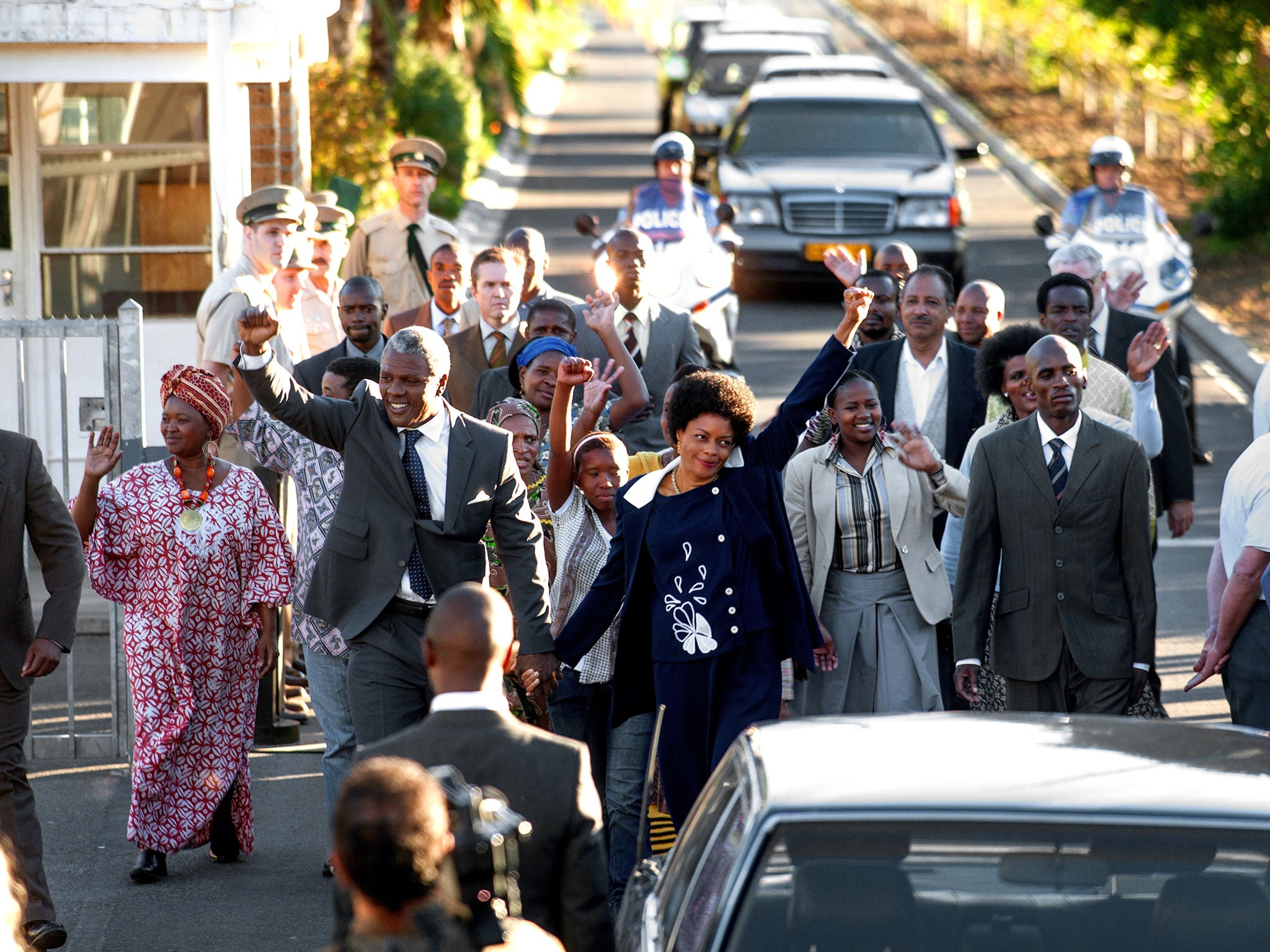Mandela: Long Walk To Freedom, film review - 'Idris Elba's performance is stirring'
A moving but very uneven journey

The biopic is the most rigid of genres. There is something inherently reductive and unsatisfactory about turning the life of a notable figure into a chronological, two-and-a-half hour drama.
Justin Chadwick's film about Nelson Mandela tries to capture its subject's yearnings and regrets rather than just portraying him as the visionary and magnanimous "great man of history" who guided South Africa out of the apartheid era. Even so, the sense of boxes being ticked, key events covered, is never quite overcome.
Long Walk to Freedom begins very movingly with Mandela (Idris Elba) describing in voice-over a recurring dream he has of his happy childhood home. Like the elderly professor in Ingmar Bergman's Wild Strawberries, he is conjuring up memories of a time long gone when "the child ran free."
British screenwriter William Nicholson (who also wrote Shadowlands) attempts throughout to balance the sweeping historical drama with an intimate study of a man who suffered acute emotional loss. Arguably, the strongest part of the film is that dealing with Mandela's marriage to Winnie (the excellent Naomie Harris). When they first meet, he rhapsodises over her beauty. He is utterly devoted to her.
The film-makers don't skimp from showing how the marriage disintegrated during Mandela's captivity. Whereas he was eventually prepared to negotiate with the white apartheid Government, she felt an utter hatred for them and an understandable determination to use violence to bring it down. Chadwick includes harrowing scenes of her own imprisonment and her many months in solitary confinement. He also shows her supporters "necklacing" a suspected informer – that's to say, placing a rubber tyre round the victim's neck and then setting fire to it. "What they have done to my wife is their only victory over me," Mandela declares at one point.
The film shows Mandela beginning his career as a young lawyer and activist within the ANC. The white legal establishment refuse to deal with him in an even-handed way. This is still a society in which a black lawyer is referred to as "boy". Mandela's political consciousness is fast rising, but he is a womaniser and neglectful father. His first wife, Evelyn (Terry Pheto), is exasperated by his behaviour.
It is left to Elba to give emotional complexity to a story whose triumphant ending we all know well in advance. Elba's performance is stirring and very effective. He doesn't just capture the gait, voice, mannerisms and self-deprecating humour of an immensely well-known figure, but he shows us a character who is constantly changing. The young Mandela is very different from the sainted figure we encounter in the final reel. He is athletic (continually shown boxing), charismatic, angry and confrontational. He is also a pragmatist in the fight against white supremacy.
The film-makers include his famous statement from the dock at the time of his 1964 sabotage trial (when he talks of his ideal of a "democratic and free society" for which he is prepared to die.) At the same time, they hint at his despair in the early days of his imprisonment on Robben Island when he is separated from his family and seemingly powerless to help them.
Nicholson's screenplay foregrounds the campaign that Mandela mounted for black prisoners on the Island to be allowed to wear long trousers. The victory he achieves, although seemingly trivial, has huge symbolic weight. The warders begin to treat the prisoners with more respect. The prisoners are able to stop thinking of themselves as victims.

Watch Apple TV+ free for 7 days
New subscribers only. £8.99/mo. after free trial. Plan auto-renews until cancelled

Watch Apple TV+ free for 7 days
New subscribers only. £8.99/mo. after free trial. Plan auto-renews until cancelled
There is an obvious contrast between Mandela's day-to-day existence during the latter days of his captivity, where we even see him growing tomatoes, and the convulsions in South African society as a whole during the late apartheid era. Chadwick portrays the unrest in predictable fashion, with montages of newsreel material showing fighting on the streets to music from Bob Marley and Public Enemy. There is also the inevitable footage of the Nelson Mandela 70th birthday tribute concert, staged at Wembley in 1988 and broadcast around the world. The other ANC leaders don't all agree with Mandela's decision to enter into negotiations with the apartheid government – but Mandela blithely ignores them.
The film-makers use flashbacks, voice-over, music, archive footage and quickfire editing in a bid to make the chronological storytelling more dynamic. We always know, though, just where the script is taking us. It would have been extremely perverse to make a biopic about Mandela that wasn't reverential.
In the latter stages, a sentimentality creeps in. Mandela's reason for pursuing reconciliation is practical as well as idealistic – a way to avoid a bloody civil war. He has the probity and strength of personality to make such a policy possible. Even so, the scene in which we see him telling his doe-eyed grandchildren not to resort to violence against the whites ("that is what they do to us, we must do better") seems heavy-handed and mawkish.
Mandela: Long Walk to Freedom is a very uneven journey. The film is at its most powerful when it is at its most intimate, especially when it is giving us a sense of Mandela's loss – his longing for his childhood and his devastation at his separation from Winnie. The filmmakers, though, are so busy celebrating his achievements that they are reluctant to spend too long asking just what those achievements cost him.
Mandela: Long Walk to Freedom
Show all 7Subscribe to Independent Premium to bookmark this article
Want to bookmark your favourite articles and stories to read or reference later? Start your Independent Premium subscription today.

Join our commenting forum
Join thought-provoking conversations, follow other Independent readers and see their replies